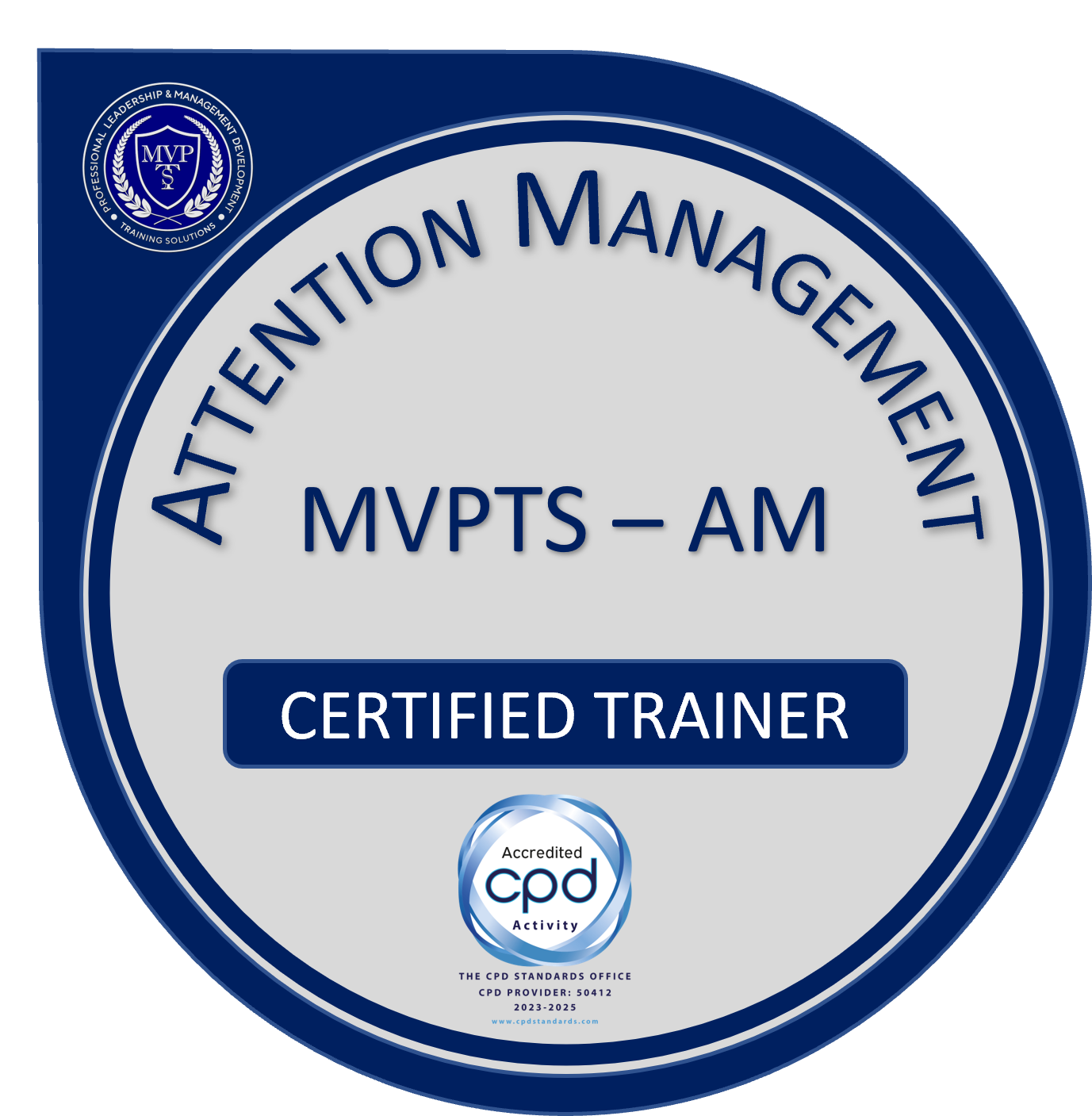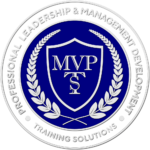Attention Management Mastery

Course Description
Title: Certified Master of Attention Management in Productivity-Driven Cultures
Immerse yourself in the world of effective attention management through our comprehensive certification course, “Attention Management.” In today’s fast-paced workplace, the ability to harness and direct your focus is paramount. This course delves into the intricacies of attention, providing you with invaluable insights into cognitive load, digital distractions, and stress management. Explore techniques to prioritize tasks, including time blocking for enhanced focus and goal alignment for career success. Navigating the digital landscape, you’ll learn strategies to combat information overload, master email communication, and detox from technology for improved concentration. Unlock the potential of your mind with mindfulness and meditation practices, fostering attention enhancement and stress reduction. Design your optimal work environment by understanding the impact of ergonomics, lighting, and acoustics on concentration. Grasp the detrimental effects of multitasking and embrace efficiency through single-tasking and batch processing. Foster holistic well-being by cultivating healthy habits that sustain attention and productivity, encompassing sleep, nutrition, hydration, and exercise. Enrich your professional toolkit with our “Attention Management” Certification, equipping you with the skills to thrive in a demanding world where attention is the ultimate currency.
Topics Covered
1. Module I – The Importance of Attention Management in the Workplace
- Understanding the Link Between Attention Management and Productivity
- Impact of Poor Attention Management on Employee Well-being
- Recognizing the Signs of Attention Deficit in the Workplace
- Benefits of Effective Attention Management for Professional Growth
2. Module II – Cognitive Load and its Impact on Attention Management
- Exploring the Components of Cognitive Load and Attention Management
- How Cognitive Load Affects Decision Making and Attention Allocation
- Cognitive Load’s Influence on Learning, Information Retention, and Attention
- Strategies to Optimize Cognitive Load for Better Attention Management
3. Module III – Strategies for Prioritizing Tasks and Activities with Attention Management
- Importance of Clear Goals in Task Prioritization and Attention Allocation
- Differentiating Between Urgent and Important Tasks for Attention Management
- Eisenhower Matrix: A Framework for Effective Prioritization of Attention
- Adapting Prioritization Strategies to Different Work Environments and Attention Needs
4. Module IV – Digital Distractions and Effective Digital Detox Strategies for Attention Management
- Identifying Common Sources of Digital Distractions and Your Impact on Attention
- The Psychological Impact of Continuous Digital Connectivity on Attention
- Implementing “Tech-Free” Periods for Enhanced Focus and Attention Management
- Balancing Digital Engagement and Professional Responsiveness with Attention Management
5. Module V – Time Blocking Techniques for Enhanced Focus and Attention Management
- Introduction to Time Blocking as a Productivity Technique for Attention Management
- Creating an Effective Time Blocking Schedule for Better Attention Allocation
- Addressing Challenges and Adjusting Time Blocks to Enhance Attention Management
- Maximizing Focus and Accomplishment Through Time Blocking and Attention Allocation
6. Module VI – Mindfulness and Meditation for Attention Enhancement and Attention
- Understanding the Role of Mindfulness in Attention Enhancement and Management
- Differentiating Between Mindfulness and Meditation Practices for Attention Management
- Incorporating Mindful Breaks into the Workday to Enhance Attention
- Long-Term Effects of Mindfulness on Attention, Stress Reduction, and Attention Management
7. Module VII – Creating an Optimal Work Environment for Improved Concentration and Attention Management
- Ergonomics and its Impact on Work Concentration and Attention Management
- Optimizing Lighting and Acoustics for Focus and Attention Management
- Personalizing Workspaces for Individual Attention Preferences and Management
- Minimizing Distractions in the Physical Workspace for Better Attention Management
8. Module VIII – Techniques to Minimize Multitasking and Improve Efficiency through Attention Management
- The Myth of Multitasking: Cognitive Costs and Drawbacks on Attention Management
- Single-Tasking and its Effects on Task Completion Speed and Attention Allocation
- Implementing Batch Processing to Enhance Efficiency and Attention Management
- Transitioning from Multitasking to Sequential Task Management for Better Attention Allocation
9. Module IX – Goal Setting and Attention Alignment for Career Success through Attention Management
- Setting SMART Goals for Enhanced Attention Focus and Management
- Aligning Daily Activities with Long-Term Career Aspirations through Attention Management
- Monitoring Progress and Adjusting Goals for Maximum Impact on Attention Management
- Leveraging Attention Management to Accelerate Career Growth through Better Attention Allocation
10. Module X – Dealing with Information Overload: Filtering and Synthesizing Information with Attention Management
- Understanding the Challenges of Information Overload and Attention Management
- Developing Effective Information Filtering Techniques for Better Attention Allocation
- Synthesizing Complex Information for Quick Decision Making and Attention Management
- Tools and Strategies to Stay Updated Without Overwhelm and for Better Attention Management
11. Module XI – Stress Management and its Role in Attention Management
- Exploring the Connection Between Stress and Attention Deficit for Better Attention Management
- The Physiology of Stress and its Impact on Cognitive Function and Attention
- Stress Reduction Techniques for Improved Attention and Focus Management
- Building Resilience to Enhance Attention Management in the Face of Stress
12. Module XII – Building Healthy Habits for Sustained Attention and Productivity
- The Role of Sleep in Cognitive Performance, Attention, and Productivity
- Nutrition and Hydration: Fueling the Brain for Optimal Focus and Attention Management
- Regular Exercise and its Positive Effects on Attention Span and Productivity
- Establishing a Daily Routine that Supports Attention, Sustainability, and Productivity
How to use this Certification
- Improved Productivity: A “Certified Master of Attention Management” Certification equips you with advanced skills to optimize your focus and attention, resulting in significantly improved productivity. You’ll learn how to minimize distractions and prioritize tasks effectively.
- Enhanced Time Management: With this Certification, you’ll gain a deep understanding of time management techniques that help you make the most of your day. You’ll be able to allocate your time efficiently to accomplish tasks and goals.
- Reduced Stress: Attention management skills can significantly reduce stress levels. Certified masters can manage their attention and emotions better, leading to a calmer and more composed work environment.
- Sharpened Decision-Making: This Certification helps you make better decisions by teaching you how to analyze information and prioritize effectively. You’ll become more adept at discerning critical information from the noise.
- Increased Creativity: Attention management techniques can unlock your creative potential. Certified masters are better at cultivating an environment that fosters creativity and innovation in their work.
- Enhanced Work-Life Balance: With better attention management, you’ll be more equipped to balance your professional and personal life, leading to improved overall well-being and satisfaction.
- Better Relationships: Improved attention management skills enable you to be more present and engaged in your interactions with others, fostering stronger and more meaningful relationships, both at work and in your personal life.
- Career Advancement: A “Certified Master of Attention Management” Certification gives you a competitive edge in your career. Employers highly value individuals who can stay focused, meet deadlines, and maintain high productivity levels.
- Adaptability: Attention management certification equips you with the ability to adapt to new challenges and maintain productivity even in dynamic environments.
- Lifelong Skill: The skills and techniques learned through this Certification are not just valuable in the professional realm but also in your personal life. They are lifelong skills that can benefit you in various aspects of your life, making it a wise investment in your personal development.
Target Audience
- Working Professionals: In various industries, looking to enhance your attention management skills to boost productivity and effectiveness in your jobs.
- Students: Students at all levels (high school, college, graduate) seeking to improve their ability to focus on their studies and manage their attention amidst academic demands.
- Entrepreneurs and Small Business Owners: Running your own businesses who need to juggle multiple tasks and responsibilities, requiring effective attention management for success.
- Remote Workers: People working from home or other remote locations, aiming to overcome distractions and maintain focus in a less structured environment.
- Creative Professionals: Artists, writers, designers, and other creatives seeking ways to balance focused attention with creative thinking in their work.
- Parents and Caregivers: Those managing multiple responsibilities who want to better manage your attention while also handling family and caregiving duties.
- Stress Management Seekers: Those looking to reduce stress by improving their attention management skills, as stress and attention are closely interconnected.
- Students of Mindfulness and Well-being: People interested in mindfulness and personal development who wish to integrate attention management techniques into their holistic well-being practices.
- Time-Management Enthusiasts: People looking to refine their time management skills by mastering attention management, recognizing its crucial role in effective time utilization.
- Professionals Transitioning Careers: Professionals seeking to switch careers who want to ensure a smooth transition by developing attention management skills that will serve them in their new role.
Learning Objectives
- Understand the concept of Attention Management and its significance in the workplace.
- Recognize the relationship between Attention Management, productivity, and employee well-being.
- Identify the signs of poor Attention Management and its effects on cognitive performance.
- Explore strategies to enhance attention, decision-making, and information retention by managing cognitive load.
- Apply effective techniques for prioritizing tasks and activities based on attention allocation.
- Evaluate the impact of digital distractions on attention and implement detox strategies.
- Utilize time-blocking techniques to optimize focus and attention allocation.
- Differentiate between mindfulness and meditation practices and your roles in attention enhancement.
- Design an optimal work environment that promotes concentration and attention management.
- Develop strategies to minimize multitasking and increase efficiency through improved attention allocation.
Learning Outcomes
- You will be able to define Attention Management and explain its relevance to workplace productivity.
- You will be able to identify the effects of poor Attention Management on both productivity and employee well-being.
- You will be able to recognize signs of attention deficit and its consequences on cognitive performance.
- You will be able to apply strategies to manage cognitive load, leading to improved decision-making and information retention.
- You will be able to prioritize tasks effectively, considering attention allocation and urgency.
- You will be able to identify sources of digital distractions and your impact and implement strategies for detox.
- You will be able to create and implement time-blocking schedules to enhance focus and attention.
- You will be able to differentiate between mindfulness and meditation and apply them for attention enhancement.
- You will be able to design work environments that optimize concentration and minimize distractions.
- You will be capable of applying techniques to minimize multitasking, leading to improved efficiency through focused attention allocation.
